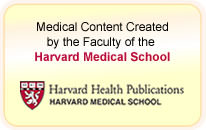
Conditions in Depth
This page contains the basic information about High Blood Pressure (Hypertension) .
Return to the High Blood Pressure (Hypertension) Main Condition Center
Diagnosis
The diagnosis of hypertension depends on blood pressure readings. Therefore, it's essential that blood pressure be measured carefully.
To obtain an accurate blood pressure measurement:
-
Avoid the following for at least one hour before you have your blood pressure taken:
-
Strenuous exercise
-
Smoking
-
Eating
-
Drinking caffeinated beverages
-
-
Be seated for at least five minutes before the reading is taken.
-
Do not talk while your blood pressure is being measured.
-
Two readings should be recorded and averaged.
If your blood pressure is high, your doctor should examine your eyes, heart and nervous system, to look for evidence of damage from hypertension.
If there is no such evidence, you should return for at least two more blood pressure measurements. Only then should the doctor diagnose you with hypertension. That is because a single high reading can happen to anyone.
Once you are diagnosed with hypertension, other tests will check for organ damage. These tests can include:
-
Blood tests to check kidney function
-
An electrocardiogram (EKG) to look for:
-
Thickening of the heart muscle
-
Reduced blood flow to your heart
-
Irregular heart rhythms
-
From Health A-Z, Harvard Health Publications. Copyright 2006 by the President and Fellows of Harvard College. All rights reserved. Written permission is required to reproduce, in any manner, in whole or in part, the material contained herein. To make a reprint request, contact Harvard Health Publications. Used with permission of StayWell.